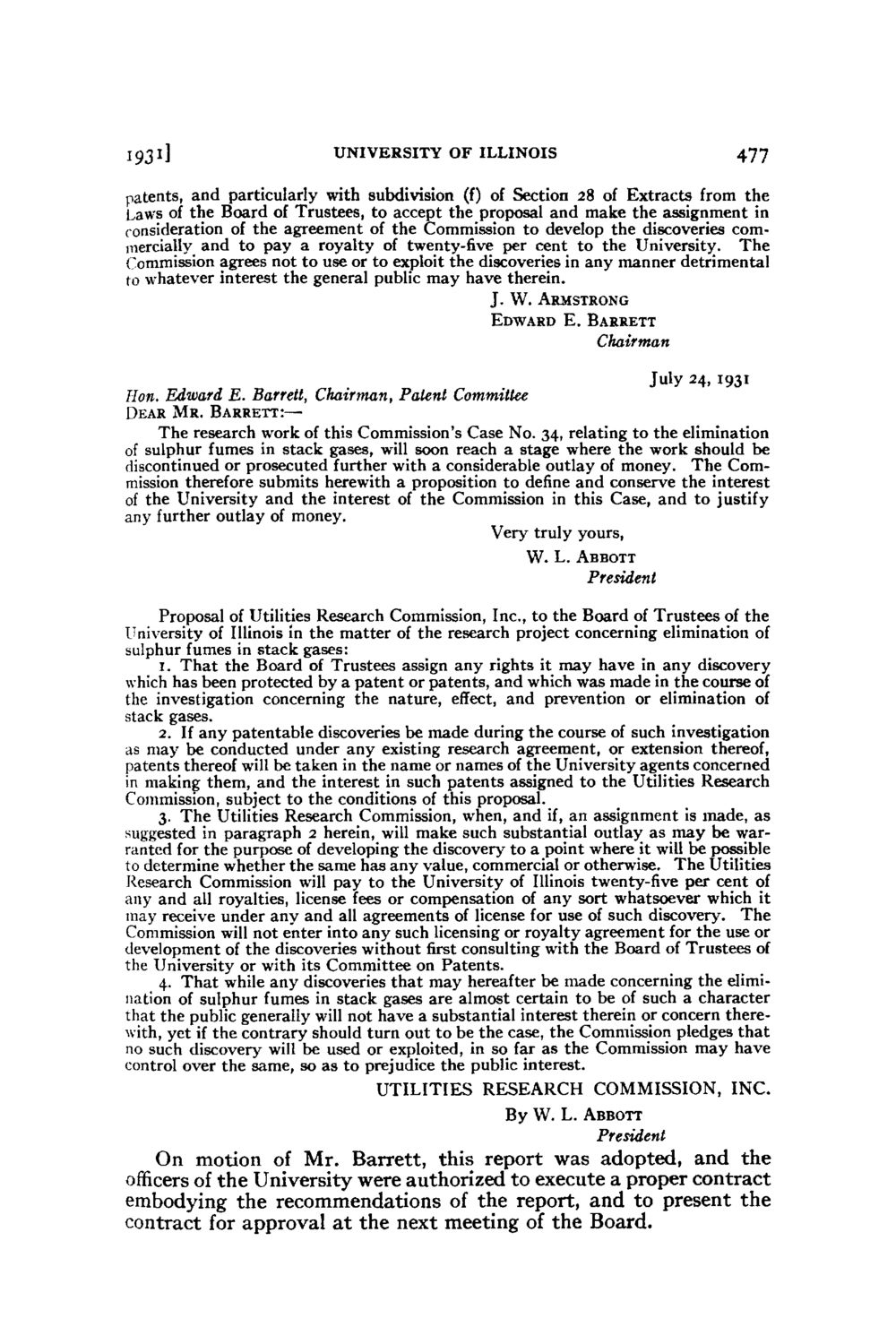| |
| |
Caption: Board of Trustees Minutes - 1932
This is a reduced-resolution page image for fast online browsing.

EXTRACTED TEXT FROM PAGE:
i93J] U N I V E R S I T Y O F ILLINOIS 477 patents, and particularly with subdivision (f) of Section 28 of Extracts from the Laws of the Board of Trustees, to accept the proposal and make the assignment in consideration of the agreement of the Commission to develop the discoveries commercially and to pay a royalty of twenty-five per cent to the University. T h e Commission agrees not to use or to exploit the discoveries in any manner detrimental to whatever interest the general public m a y have therein. J. W. Armstrong Edward E. Barrett Chairman July 24, 1931 Hon. Edward E. Barrett, Chairman, Patent Committee Dear M r . Barrett:— The research work of this Commission's Case No. 34, relating to the elimination of sulphur fumes in stack gases, will soon reach a stage where the work should be discontinued or prosecuted further with a considerable outlay of money. The C o m mission therefore submits herewith a proposition to define and conserve the interest of the University and the interest of the Commission in this Case, and to justify any further outlay of money. Very truly yours, W. L. Abbott President Proposal of Utilities Research Commission, Inc., to the Board of Trustees of the University of Illinois in the matter of the research project concerning elimination of sulphur fumes in stack gases: I. That the Board of Trustees assign any rights it m a y have in any discovery which has been protected by a patent or patents, and which was made in the course of the investigation concerning the nature, effect, and prevention or elimination of stack gases. 2. If any patentable discoveries be made during the course of such investigation as may be conducted under any existing research agreement, or extension thereof, patents thereof will be taken in the name or names of the University agents concerned in making them, and the interest in such patents assigned to the Utilities Research Commission, subject to the conditions of this proposal. 3. The Utilities Research Commission, when, and if, an assignment is made, as suggested in paragraph 2 herein, will make such substantial outlay as m a y be warranted for the purpose of developing the discovery to a point where it will be possible to determine whether the same has any value, commercial or otherwise. The Utilities Research Commission will pay to the University of Illinois twenty-five per cent of any and all royalties, license fees or compensation of any sort whatsoever which it may receive under any and all agreements of license for use of such discovery. T h e Commission will not enter into any such licensing or royalty agreement for the use or development of the discoveries withoutfirstconsulting with the Board of Trustees of the University or with its Committee on Patents. 4. That while any discoveries that m a y hereafter be made concerning the elimination of sulphur fumes in stack gases are almost certain to be of such a character that the public generally will not have a substantial interest therein or concern therewith, yet if the contrary should turn out to be the case, the Commission pledges that no such discovery will be used or exploited, in so far as the Commission m a y have control over the same, so as to prejudice the public interest. UTILITIES R E S E A R C H C O M M I S S I O N , INC. By W. L. Abbott President O n m o t i o n of M r . Barrett, this report w a s adopted, a n d t h e officers of the University w e r e authorized to execute a proper contract e m b o d y i g approval at d a next of the of the B n d d . contract nfor the r e c o m m e nthet i o n s meetingreport, a o a r to present t h e
| |